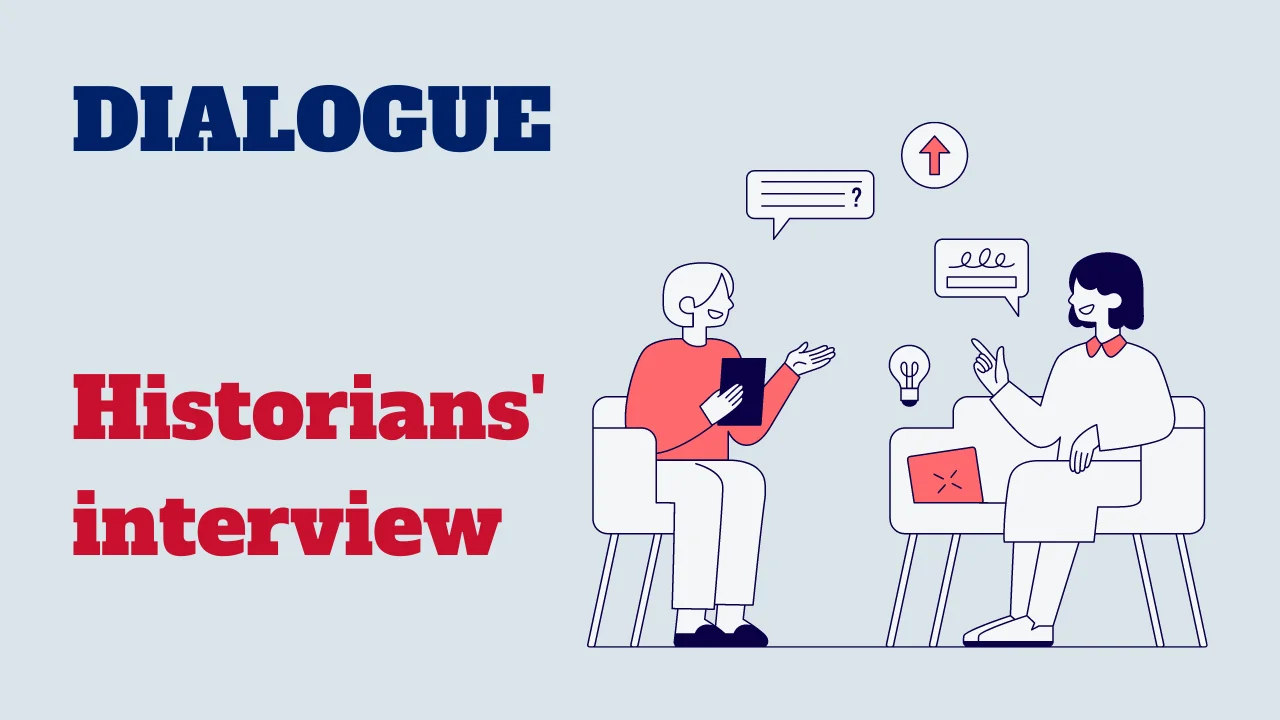Engage in an interview between two historians as they delve into the complexities of historical research, interpretation, and analysis.

Whether discussing historical events, methodologies, or the significance of studying the past, this dialogue will help you build your vocabulary related to history and historical inquiry.
Dialogue: Historians’ Interview
Historian 1: Good afternoon! It’s a pleasure to have this opportunity to interview you and discuss our shared passion for history.
Historian 2: Good afternoon! Likewise, I’m excited to engage in this conversation and exchange insights about our respective areas of expertise. History is such a rich and multifaceted discipline, isn’t it?
Historian 1: Absolutely. As historians, we play a crucial role in uncovering the past, interpreting historical events, and making sense of the complexities of human experience. I’m curious to hear about your research interests and the topics you’ve been exploring lately.
Historian 2: I’ve been focusing on early modern European history, particularly the political, social, and cultural transformations of the Renaissance and Reformation periods. It’s a fascinating era characterized by profound changes in art, religion, and governance, and I’ve been exploring how these developments shaped the course of history.
Historian 1: That sounds fascinating. Early modern Europe is such a pivotal period in world history, marked by significant shifts in power dynamics, intellectual thought, and societal norms. I’ve been drawn to the study of ancient civilizations, particularly the civilizations of Mesopotamia and Egypt, and their contributions to human civilization.
Historian 2: Ancient civilizations have always intrigued me as well. The achievements of Mesopotamian and Egyptian societies in architecture, literature, and governance laid the foundation for subsequent civilizations and continue to influence our understanding of history today. It’s remarkable how the past continues to resonate in the present.
Historian 1: Indeed. As historians, we’re tasked with piecing together fragments of the past to construct narratives that help us make sense of the world around us. However, historical interpretation is often subjective, influenced by our own biases, perspectives, and cultural contexts. How do you approach the challenge of interpreting historical evidence?
Historian 2: That’s an excellent question. Historical interpretation requires a careful analysis of primary sources, secondary literature, and archaeological evidence, as well as an awareness of the limitations and biases inherent in historical research. I strive to adopt a critical and interdisciplinary approach to historical inquiry, drawing on insights from anthropology, sociology, and other fields to enrich my understanding of the past.
Historian 1: I couldn’t agree more. It’s essential to approach historical research with humility and an openness to multiple perspectives, recognizing that our understanding of the past is constantly evolving. By engaging in dialogue with fellow historians and embracing diverse methodologies, we can uncover new insights and enrich our interpretations of history.
Historian 2: Absolutely. Collaboration and exchange of ideas are integral to the advancement of historical scholarship. I’m grateful for the opportunity to engage in this conversation and learn from your perspectives and experiences as a fellow historian.
Historian 1: Likewise. It’s been a stimulating discussion, and I look forward to continuing our dialogue and exploring new avenues of historical inquiry together. Thank you for sharing your insights and expertise.
Historian 2: Thank you as well. The pleasure was mine. Let’s continue to unravel the mysteries of the past and illuminate the complexities of human history through our research and scholarship.
Experience an interview between two historians as they discuss their research interests, methodologies, and approaches to historical interpretation. Practice your English language skills while exploring topics in early modern European history, ancient civilizations, and the challenges of historical research. Whether reflecting on the significance of studying the past or debating the nuances of historical interpretation, this dialogue provides a practical scenario for language learners to engage in discussions on the discipline of history and its impact on our understanding of the world. Happy exploring!



